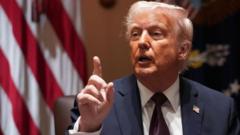In their initial conversation, US President Donald Trump and Canadian Prime Minister Mark Carney discussed trade issues, tariffs, and their nations' economic future.
Trump and Carney Engage in Diplomatic Dialogue Amid Trade Tensions

Trump and Carney Engage in Diplomatic Dialogue Amid Trade Tensions
Leaders address trade disputes in first call since Carney’s election as Prime Minister.
US President Donald Trump recently reported an "extremely productive" first call with Canadian Prime Minister Mark Carney amidst a growing trade conflict between the two countries. In a post on Truth Social, Trump revealed plans for an in-person meeting immediately following Canada’s elections on April 28 to delve further into "politics, business, and all other factors."
Prime Minister Carney, engaged in an election campaign, described their conversation as "very constructive." He emphasized Canada's commitment to imposing retaliatory tariffs aimed at safeguarding Canadian workers. Trump's introduction of a 25% tariff on vehicle imports is set to begin on April 2, a decision that could significantly harm Canada's automotive sector.
Typically, it is customary for new Canadian Prime Ministers to establish communication with the US President shortly after taking office. However, this marked the first discourse between Carney and Trump since Carney took office on March 14. According to the Prime Minister’s office, both leaders agreed to initiate comprehensive negotiations focusing on a new economic and security relationship right after the election. In the interim, they decided to increase dialogue between Canada’s Minister of International Trade, Dominic LeBlanc, and the US Secretary of Commerce, Howard Lutnick, to address pressing issues.
Previously, Trump’s demeanor toward Canada was less cordial, often making derogatory remarks about Carney's predecessor, Justin Trudeau. Alongside his tariff initiatives, Trump has controversially suggested integrating Canada as the 51st state of the United States—a notion that has drawn considerable backlash from Canadians.
In a stark warning, Carney stated that Canada may no longer view the US as a reliable trading partner, asserting that the previous dynamic between their countries is "over." As the leader of the Liberal Party, Carney has pledged to implement retaliatory tariffs with "maximum impact" on US imports. In communication with Trump, he reiterated that his administration would enforce tariffs in response to US trade actions announced for April 2, 2025.
The proposed US auto tariffs threaten around 500,000 jobs within the Canadian automotive industry. Currently, the US has already implemented a 25% tariff on various Canadian goods and on aluminum and steel imports, while Canada has retaliated with tariffs amounting to approximately C$60 billion ($42 billion) on American products.
The impending car tariffs, which will take effect on April 2, will initiate charges for businesses importing vehicles, with parts taxes to commence in May or later. The deteriorating relationship between the US and Canada is expected to be a prominent topic in Canada’s upcoming general election, with opposition leader Pierre Poilievre labeling the tariffs as "unjustified and unprovoked." Similarly, NDP leader Jagmeet Singh has described these measures as a "betrayal." Trump also cautioned Canada against collaborating with the European Union regarding potential reciprocal tariffs, which he suggested would result in "large scale tariffs," exceeding those currently proposed.






















